More data, more insight: Transparency in sustainability
Patrick, Senior Manager Sustainability Reporting in the Corporate Office Finance & Reporting at Bosch
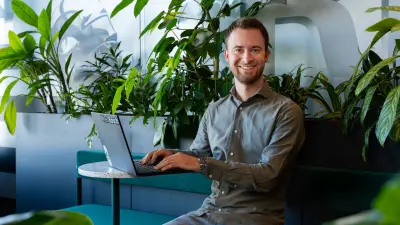
Reliable data and powerful tools — both are key when it comes to effectively steer sustainability. Patrick Hehl, Senior Manager Sustainability Reporting, and his project team are working on just that. One result of their work is the digital tool myGreenBusiness. It enables Bosch to meet its compliance requirements regarding reporting, whilst also automating and standardising reporting. For the colleagues, it is an important tool with which they can jointly support and manage the transformation towards a more climate-friendly product portfolio based on data.
The European Union's Green Deal is a comprehensive plan that aims to make Europe the world's first climate-neutral continent by 2050. “After the law was passed in 2019, Bosch decided that we needed a central project team to deal with the new legislation on sustainability and ensure that we comply with the law,” explains Patrick. “I was asked if I would be interested in joining the project. And I was. While others in the team deal with social topics in reporting, my focus right from the start was the EU taxonomy — an EU-wide system for categorising sustainable economic activities.”
EU taxonomy
The EU taxonomy is a European classification system for sustainable economic activities that was introduced as part of the EU's Green Deal. It is intended to promote investment in sustainable projects and support the EU's climate targets. In future, Bosch will be obliged to report in accordance with the EU taxonomy — which will take place annually as part of the management report. The transparency of the EU taxonomy enables companies to evaluate the transformation progress of their own business towards the EU environmental targets and to manage the development of their portfolio using corresponding KPIs. These KPIs are turnover, capital expenditure and operating expenditures. At Bosch, they correlate with non-financial indicators such as CO₂ emissions in product use.
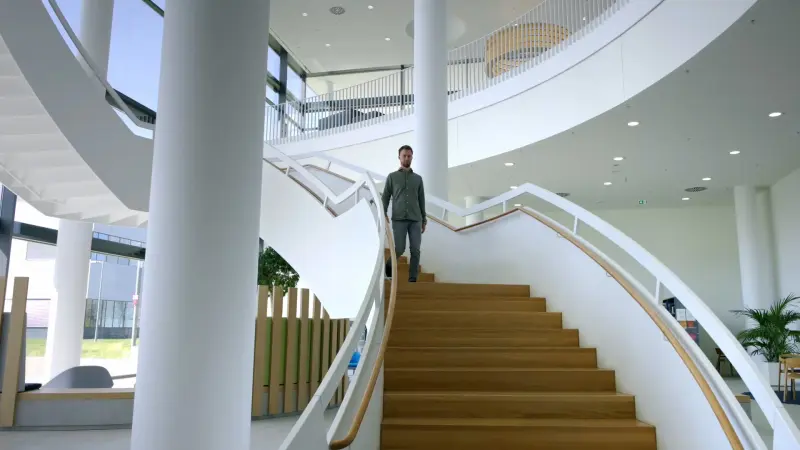
Classification of Bosch products
The aim of Patrick and his project colleagues was to develop a tool for taxonomy reporting, which would then be used by Bosch for external reporting purposes. “It was initially important to find out which products already fulfil the EU's sustainability criteria — and which do not. Take Bosch’s household appliances, for example: the sustainability criterion is the energy efficiency label, which most people are familiar with. Appliances rated A or B fulfil the requirements, all others are classified by the EU as not taxonomy-aligned,” explains Patrick.
There are many different products at Bosch. Gaining an overview was a major task. However, the project team from the Sustainability and Finance departments were not left to tackle this on their own: “We have sustainability coordinators that manage the sustainability activities in our various business areas and who connect us with the relevant product experts. With their help, we were able to categorise all our products according to the various criteria. Together with our colleagues from management accounting, we also examined how we are able to report the EU-required indicators on a regular basis in the future,” says Patrick.
The insights into the various business areas were exciting for Patrick — and the many new contacts were a great benefit. However, it was also a little tricky: “Bosch is a comparatively heterogeneous company with different business divisions. That’s why we had to check individually how we could access the required data. Sometimes we could easily get the data from a division because they already measured it as a standard indicator, other times this was not the case at all,” Patrick explains. “Today, we have all the information we need across all divisions.”
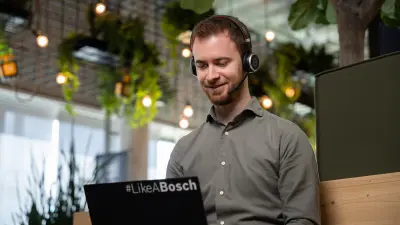
Digital tool development
“Right from the start, our aim was to digitalise and automate reporting globally. We wanted to prevent spreadsheets being sent by email month after month throughout the Bosch Group. That would be error-prone and inefficient,” emphasises Patrick. “At the same time, we realised relatively quickly the potential that the taxonomy offers Bosch. That’s why we made sure we considered the benefits right from the start when developing the tool.”
Once the requirements for the tool had been finalised, we moved on to implementation. “And this started with a challenge: as the project team, we had our specialised expertise, while the programming team had the IT perspective. We had to find a common language so that the expectations and results would fit together in the end. To prevent us from only seeing the final product and thus being able to make adjustments too late, we proceeded with the implementation step by step in sprints. This gave us the opportunity to provide regular feedback — and today we are very glad that we were able to develop our myGreenBusiness tool together!” says Patrick happily.
The tool is ready, and the data is available. But how does the data get into the tool? This has changed over the time of the project, explains Patrick: “In the beginning, the reporting colleagues actually accessed their respective systems, transferred the relevant key figures to a spreadsheet or sent exports to us by email. We looked at how we could establish interfaces so that our colleagues didn't have to assess the figures at the beginning of each month. And we succeeded!”
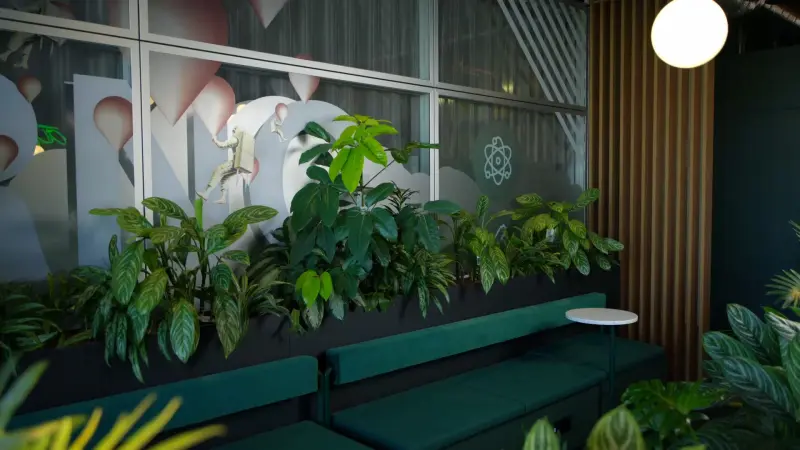
A contribution to the sustainability goals
Today, Patrick is pleased that he can actively shape the future with his work: “For me, sustainability is an area that combines economic mindedness and social responsibility in a meaningful way. Together with the project team, I ensure transparency and provide data that enables us at Bosch to make even better fact-based decisions.”
“myGreenBusiness is now used by the management accounting colleagues of the various divisions, the sustainability coordinators, and colleagues from the various central departments at Bosch, like me," says Patrick. The tool helps with reporting and at the same time highlights potential: "Where can we improve in terms of CO₂ emissions in the product use phase, for example? And how can we do that? An example that I like to use in this context: If we sell more heat pumps, it's better for the climate — as heat pumps are more environmentally friendly. The tool helps us to keep an eye on current developments across all our divisions. This complements the transparency required by the taxonomy, which we as a team are very proud of!”
myGreenBusiness — a great success
It’s not just the project team and other stakeholders at Bosch that are excited about the new tool — the recognition goes far beyond that: “Carrying out the project alone was a great success and was a lot of fun. Receiving an external award from the International Association of Controllers — the Controlling Excellence Award — was fantastic and a great external acknowledgement,” enthuses Patrick. “I'm very grateful that our managers supported us in our application for the award. We were able to present our project on stage in front of over 500 people at the Controller Congress in Munich. That was another great experience for me personally, and I look back on it fondly.”
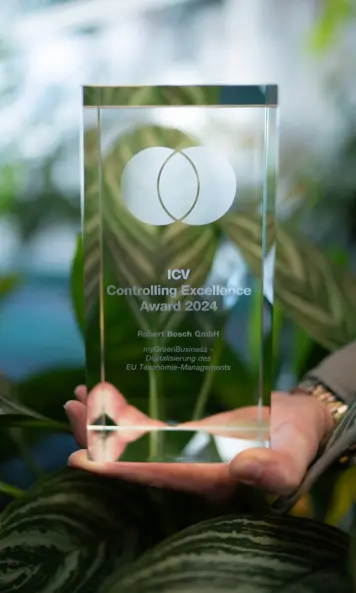
From training courses to Supervisory Board meetings
The taxonomy project does not end with the launch of myGreenBusiness: “One topic that has been on my mind recently and still is today, is developing training material for the tool. We are the experts in the field of sustainability reporting — and we can share this knowledge with other associates with targeted training. In the past, my managers have always made it possible for me to take part in training and development courses. So it's even better that I can now teach others myself and show them how they can use myGreenBusiness for their own purposes. There's still a lot of work ahead for me in the context of EU taxonomy — I'm definitely not going to get bored,” assures Patrick with a wink.
Even though taxonomy fills a large part of his working day, Patrick also devotes himself to other topics: “In addition to EU taxonomy reporting, I help prepare the Supervisory Board meeting and the Audit Committee for the consolidated financial statements of the Bosch Group once a year.”
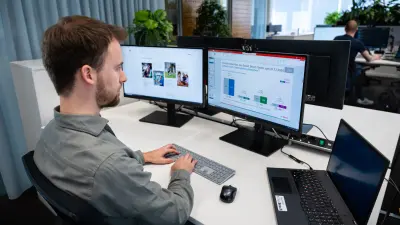
International cooperation
Patrick works with colleagues from Germany, Australia, India and Poland, among other countries. “That was also one of the reasons why I chose Bosch as an employer. International collaboration has always appealed to me,” says Patrick.
“Of course, a diverse project team also brings together a range of unique perspectives,” explains Patrick. “For collaboration to succeed, it's all the more important to know each other and how the others work. I would say that Bosch has an open, team-orientated working culture with flat hierarchies. This is the perfect basis for good cooperation. The scope for personal responsibility and the appreciation I get in my current working environment are the cherry on the cake.”
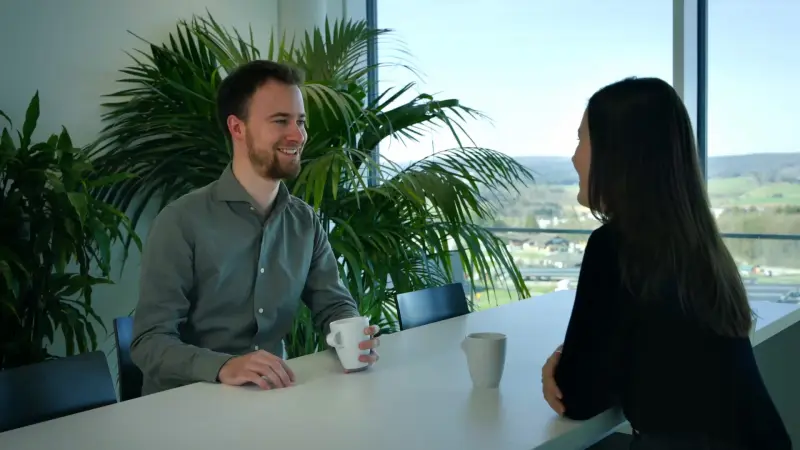
Profile
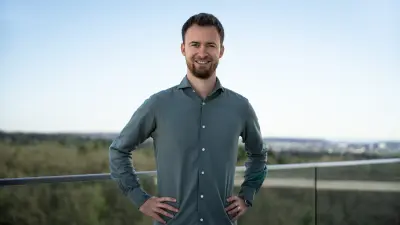
Patrick Hehl
Senior Manager Sustainability Reporting, Corporate Office Finance & Reporting at Bosch
Patrick Hehl started his apprenticeship as an industrial clerk at Bosch in Stuttgart-Feuerbach in 2012. After two and a half years, he moved to Gerlingen near Stuttgart to join the asset accounting department for the headquarters and corporate research. He decided to study in addition to his apprenticeship — and therefore began his part-time business studies programme. In 2017, shortly before graduating, he switched to Renningen to work in Controlling. In 2021, he moved to the Bosch start-up Bosch Climate Solutions, where he helped build up the controlling and commercial processes. In 2022, he moved to his current position, which arose due to the European Green Deal and the associated requirements for Bosch. One of his main projects is the myGreenBusiness tool, which creates transparency with regard to sustainable business activities at Bosch and helps to support the transformation towards a more climate-friendly product portfolio based on financial data.